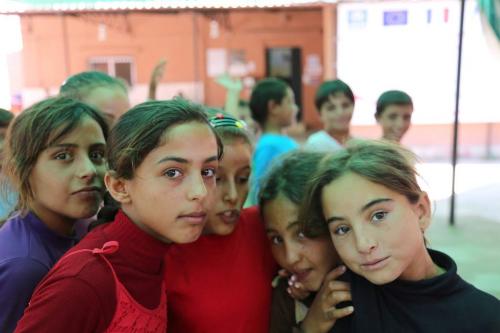Thousands of Syrian children fleeing country alone, UN agency warns
More than 4,000 Syrian children have crossed borders into neighbouring countries without parents or adult relatives, the United Nations children’s agency said, warning that without the protection of guardians, they remain extraordinarily vulnerable to exploitation and abuse.

Over half of Syrian refugees in Lebanon are children.
UN Children’s Fund (UNICEF) spokesperson Marixie Mercado told journalists in Geneva that many of the children “were working to provide income back to families, and were desperate to get back to school.”
Of the 4,150 Syrian children identified and registered, at least 1,698 are in Lebanon where in the
Beka’a Valley area, many are swept up and used for agricultural child labour.
In Iraq, the UN agency estimated that there were 300 newly-arrived unaccompanied and separated children in the north.
Jordan is home to about 1,170 children, including some as young as nine-years-old. Most of these children, Ms. Mercado said, are in Za’atari camp, which despite being a makeshift camp housing more than 120,000 people is Jordan’s fourth largest city.
“Each of those children had witnessed, or been a victim of horrific levels of violence,” Ms. Mercado said, adding that some children ran for their lives from the fighting, while others went to find relatives who had earlier left. Still others were being sent away to avoid conscription.
UNICEF was working with partners to identify the children and make sure they are being protected, as well as to provide medical, psychosocial and educational support.
She told a story of 11-year-old Aya who lived with her uncle in a settlement in an almond orchard, taking care of her younger siblings.
“She started going to UNICEF-supported recreational activities, and last Thursday, for the first time, she spoke about seeing her father hacked to pieces in front of her,” Ms. Mercado said.
In New York, UN Under-Secretary-General for Humanitarian Affairs and Emergency Relief Coordinator Valerie Amos voiced the hope that Syria’s agreement to hand over its chemical weapons would prompt countries to pledge more money for the world body’s relief efforts.
“These humanitarian issues and the human rights abuses that are really spiralling out of control inside Syria – we need our political leaders to address those as well,” she added.
Also, the UN food relief agency called for safe passage to people trapped in conflict areas in Damascus, Rural Damascus and several other areas in Syria, particularly families relying on WFP’s food rations to survive month to month.
The UN World Food Programme (WFP) “was not giving up and would deploy all its logistical possibilities and its experience in this field to reach those people,” spokesperson Elisabeth Byrs said.
She added those logistics were increasingly difficult. Since the beginning of the year, the WFP had recorded close to 50 incidents of theft and confiscation against food trucks by armed groups. This week, a WFP warehouse in Rural Damascus was caught in the crossfire when three mortar bombs hit the building, causing structural damage.
Since mid-2012, the UN agency had been unable to access 38 locations such as Moadamiyeh, Daraya, Armouk, Hajar Aswad, Yalda, Babila, Sbineh, Douma, Jobar, Qaboon, Zamalka and Erbeen which were some of the most deprived areas where even the most basic items were in scarce supply, Ms. Mercado said.
Elsewhere, in Northeast Syria, the WFP last month was unable to deliver food rations to its three partners in Al Hassakeh as the roads from both Ar Raqqa and Deir Ezzor were blocked by armed groups.
Source: UN News
- 407 reads
Human Rights
Ringing FOWPAL’s Peace Bell for the World:Nobel Peace Prize Laureates’ Visions and Actions

Protecting the World’s Cultural Diversity for a Sustainable Future

The Peace Bell Resonates at the 27th Eurasian Economic Summit

Declaration of World Day of the Power of Hope Endorsed by People in 158 Nations

Puppet Show I International Friendship Day 2020

